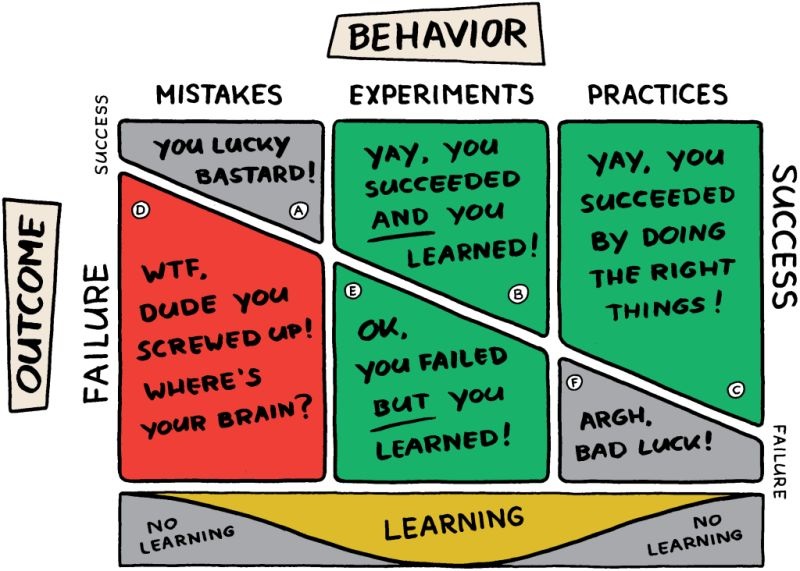Impulses for organisations – Part 7
The online world is full of information about collaboration in organisations. However, many tips and tricks are only visible for a short time and then disappear into the depths of the various social media platforms, never to be seen again. In part 7 of our series, I would once again like to “showcase” impulses from experts in the t2informatik Blog. This time it’s about mistakes, leadership, changing perspectives and Scrum Masters.
Let’s get started with the valuable impulses!
The mistakes that are really useful!
✔ Mistakes are important to learn!
✔ Mistakes should be avoided!
✳ Here you can find out which mistakes are really useful!
How does this paradox come about with regard to mistakes?
Different tasks/environments require a different view of mistakes. I like to differentiate between complexity and intricacy:
1. mistakes in the predictable & complicated world
With a little thought, you can foresee the consequences of your actions. There are usually best practices that you can use as a guide.
Example: In your tax return, you will personally learn from mistakes. But more in the painful way. This can usually be avoided by checking/preparing more carefully.
The same often applies to the stable process world in the company. (Which of course changes more frequently; VUCA sends its regards).
🤕 These mistakes hurt more than variant 2.
Of course, you also learn here and it is therefore positive for your development! However, you will sometimes be annoyed that you didn’t foresee it.
2. mistakes in the complex (VUCA or BANI) world
Here we inevitably have to experiment more. I.e. in the complex world: learning from mistakes and using them to achieve success.
✅ Learning is always desirable here!
✅ Failure/mistakes are an opportunity here
✅ This is the real learning zone for mistakes.
✅ You can only make progress here by making mistakes!
✅ Mistakes are simply part of the game here.
If you don’t make any mistakes here, you probably haven’t done anything.
So be prepared to experiment and be happy about the mistakes that happen to you on your way in this complex world! (Just remember: sometimes you are also moving in a different world where learning through mistakes hurts more).
A positive view of mistakes is always worthwhile!
The more complex the world/task is, the more important it is to consciously encourage mistakes and to put aside the painful view!
How do you deal with mistakes? What observations have you made about mistakes in your company? What do you think about the differentiated view of mistakes?
Behavior and Outcome (the Celebration Grid) by Jurgen Appelo. Source: https://medium.com/@jurgenappelo/mistakes-versus-failures-67736fd3ec1a
Two hypotheses on leadership
Last night I had an exciting exchange with Conny Dethloff on the topic of leadership, in which we discussed two hypotheses, among other things:
1. there are countless books, podcasts, vlogs, blogs, specialist articles and, last but not least, LinkedIn posts on the topic of “leadership”. And yet “leadership” seems to remain largely grey. Not tangible. Often only anchored in theory because there is no one single guide to “good” leadership. Or it is presented in a far too trivial (and also unrealisable) way: “a good leader must be x, y, z”. What is needed here is a bridge between theory and step-by-step instructions in the form of concretely realisable principles of action that are likely to lead to “good leadership”.
2) Taking this idea further: leadership exists and is only perceived as “good” or “bad” through concrete and therefore observable actions, not through personal attributes. This does not mean acting in an “exemplary” manner or behaving “loyally”. That is far too vague to be observable. A “lazy” person can simultaneously be a very hard-working person and reliably honour commitments. A connection between attribute and behaviour cannot necessarily be assumed.
What do you consider to be guiding leadership principles?
The mandate for the Scrum Master
Without a clear mandate, it’s damn hard to do a good job as a Scrum Master!
> Why? Because effective Scrum is based on taking responsibility for and shaping our environment together. Often many Scrum team members don’t take responsibility and push it solely onto the Scrum Master.
> Why? Many find the Scrum Master’s “help” and impulses annoying, impractical and dogmatic. As a result, they only support necessary improvements to a limited extent. At the same time, they recognise a need for optimisation in their work and want tailored support.
> Why? Many Scrum Masters are insecure and fear that their actions will be perceived as intrusive. In response, some tend to go to the other extreme and are virtually invisible.
> Why? Because many Scrum Masters see themselves as responsible for ensuring that Scrum runs well. This leads to them compensating where those involved have difficulties fulfilling their responsibilities. Sooner or later, such Scrum Masters end up looking like stereotypical helicopter parents.
In short, many Scrum Masters have difficulties fulfilling their responsibility for the results and effectiveness of the Scrum team without a clear definition of the task.
That is why, with the support of our mentoring programme, we have written a compact guide (in German) for clarifying the assignment as a Scrum Master and what has worked for us: Kompakt-Guide: Auftragsklaerung als Scrum Master.
I hope this guide provides inspiration to simply get more done as a Scrum Master.
Impulses and questions
Four different topics, four people with different expertise and perceptions, four individual impulses. How do we utilise mistakes? What is good leadership and how can we bring it to life? How can we sensibly change our perspective in our work context? And what does it actually take for a Scrum Master to be effective?
Questions upon questions. Perhaps you also have one or two; great! Then Part 7 of “Impulses for organisations” has also achieved its goal.
Notes:
If you like this article or would like to discuss it, please feel free to share it in your network.
[1] Steffen Uhde is HR Business Partner & Organisational Developer at Isabellenhuette Heusler GmbH & Co. KG. Information about Steffen Uhde can be found in his LinkedIn profile. You you find the impulse here in the original on LinkedIn.
Conny Dethloff has published several articles as a guest author in the t2informatik Blog.

Michael Schenkel
Head of Marketing, t2informatik GmbH
Michael Schenkel has a heart for marketing - so it is fitting that he is responsible for marketing at t2informatik. He likes to blog, likes a change of perspective and tries to offer useful information - e.g. here in the blog - at a time when there is a lot of talk about people's decreasing attention span. If you feel like it, arrange to meet him for a coffee and a piece of cake; he will certainly look forward to it!




